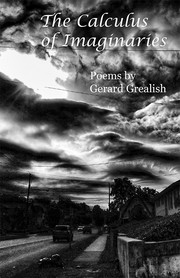Check nearby libraries
Buy this book

In The Calculus of Imaginaries, Gerard Grealish explores in poetry not only the elusive and transitory aspects of the physical world, but also our misperceptions of what "reality" is and the ramifications of discovering that it is otherwise, and largely unknowable. Within the uncertainties of such inner and outer worlds there emerges alternately from time to time a litany of anger, frustration, sorrow, guilt, pain, tragedy, and death, but also love and beauty. Addressing El Niño, the climate phenomenon, as if it were indeed a child, Grealish asks in the poem "El Niño 1997," "Whose child are you anyway?" and receives in Spanish the answer "I don't know! I don't know!" finding the child's words and inflections paradoxically beautiful. Such paradoxes abound as Grealish takes the reader in five sections through the "Imaginary Roots" of things and people, their existence as "Infinitesimals," "The Transfer Principle" that often reshapes them, the "Impossible Conditions" they are confronted with, and the "Transcendent Curves" that take them to another place. Grealish's poetry in this volume metaphorically reenacts Webster's definition of the book's abstractly mathematical title, to wit: "a method of investigating the nature of imaginary quantities required to fulfill apparently impossible conditions, using √-1 [the square root of negative one] as a unit."
Check nearby libraries
Buy this book

Subjects
American literature| Edition | Availability |
|---|---|
| 1 |
aaaa
|
| 2 |
zzzz
|
Book Details
Edition Notes
Classifications
The Physical Object
ID Numbers
Community Reviews (0)
| December 30, 2021 | Edited by ImportBot | import existing book |
| May 14, 2020 | Edited by Raymond P. Hammond | Edited without comment. |
| May 14, 2020 | Created by Raymond P. Hammond | Added new book. |









